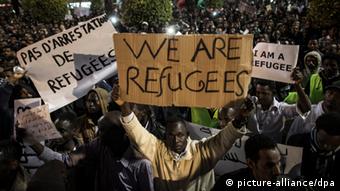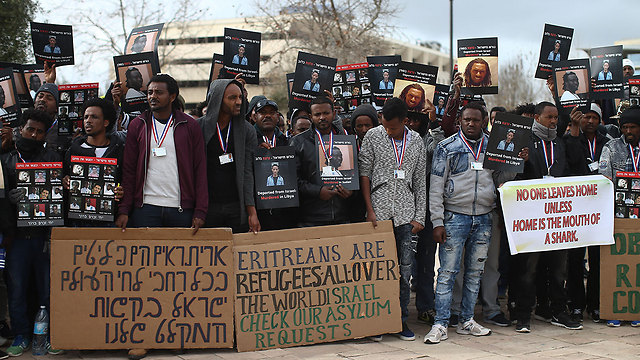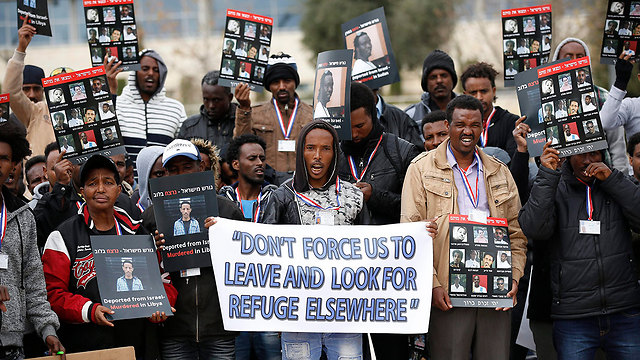The Israeli prime minister said Sunday he had reached an "international agreement" that allowed his country to deport around 40,000 African refugees.
The asylum seekers, mainly from Sudan and Eritrea, entered Israel through Egypt's Sinai Peninsula in the early and mid-2000s.
Prime Minister Benjamin Netanyahu's Cabinet also approved plans to shut down the Holot migrant detention center in southern Israel and gave asylum seekers a three-month deadline to leave the country or face deportation.

Activists say that refugees from Sudan and Eritrea cannot return to their "dangerous" homelands
The Israeli government says the African migrants are "infiltrators" and not genuine refugees.
"The infiltrators will have the option to be imprisoned or leave the country," Israel's Public Security Ministry said in a statement.
"This removal is enabled thanks to an international agreement I achieved that enables us to remove the 40,000 remaining infiltrators without their consent. This is very important," Netanyahu said at the start of his Cabinet meeting.
"This will enable us to close down Holot and allocate some of the large funds going there to inspectors and removing more people," the prime minister added.
Read more:
Move slammed
It is unclear whether the African asylum seekers would be sent back to their homelands or a third country.
In a Twitter statement, Gilad Erdan, Israel's public security minister, said the Holot closure was conditioned on "us seeing that the policy of removing infiltrators to a third country was indeed taking place."
Neither Erdan nor Netanyahu provided details about the third country.
Activists say that refugees from Sudan and Eritrea cannot return to their "dangerous" homelands.
"Instead of turning away refugees within its territory, Israel can and should protect asylum seekers like other countries of the world, instead of imprisoning them or deporting them to continue the journey as refugees," a coalition of human rights organizations in Israel said.
On Sunday morning, the Netanyahu cabinet unanimously approved a proposal submitted by Interior Minister Aryeh Deri (Shas) and Public Security Minister Gilad Erdan (Likud), to gradually close down the Holot detention facility about a mile from Israel’s border with Egypt.
Government approves closure of Holot facility within 4 months
Ministers extend temporary order to keep facility housing illegal migrants and asylum seekers open for only three more months in effort to encourage 'voluntary departure' to Rwanda.
Moran Azulay, Amir Alon, Yishai Porat|Published: 19.11.17
The government unanimously approved on Sunday a bill proposal to close the Holot detention facility, which houses African illegal immigrants and asylum seekers.
The government extended the temporary order keeping the Holot facility open by only three months in an effort to encourage "voluntary departure" and close down the facility within four months.
The illegal immigrants and asylum seekers from Eritrea and Sudan will face two options: either be imprisoned in the
Saharonim Prison or expelled to
Rwanda under an agreemend the African country signed with the State of Israel.
Asylum seekers protesting against expulsion in Jerusalem (Photo: Ohad Zwigenberg)
"Our policy towards infiltrators is three staged," Prime Minister Benjamin Netanyahu said Sunday. "Stage one is halting. We built a fence and enacted laws that completely blocked the flow of infiltrators, and today we have zero infiltrators."
"Second stage is removal," he continued. "We removed approximately 20,000 out of the existing infiltrators using various measures."
"Stage three is increased removal," Netanyahu went on to say. "This removal is enabled thanks to an international agreement I achieved, which allows us to remove the 40,000 remaining infiltrators without their consent. This is very important. It will enable us later to make the 'Holot' facility unnecessary and to use part of the vast resources we allocate there for inspectors and increased removal. That is why we are succeeding here. But our goal is to continue removing significantly more then what we have until now."
According to the Public Security Ministry, the costs of keeping the facility open amount to NIS 240 million annually.
Asylum seekers protesting against expulsion in Jerusalem (Photo: EPA)
The proposal by Interior Minister Aryeh Deri and Public Security Minister Gilad Erdan includes a plan to gradually close the facility within a few months, provided that the agreement signed with Rwanda goes ahead as planned.
About a month ago, Netanyahu announced the agreement had been amended to allow Israel to deport illegal migrants to Rwanda even without their consent.
The agreement was altered following an August ruling by the High Court of Justice, which determined the State of Israel cannot detain illegal immigrants and asylum seekers who refuse "voluntary departure" for more than 60 days if the agreement with the third party does not allow forced deportation.
"An infiltrator who is not in Holot will either be in prison or outside of Israel," Deri said after the approval of the legislation proposal. "This is the right policy to ease the suffering of residents in south Tel Aviv and other neighborhoods where the infiltrators reside. My duty is to return peace and quiet to south Tel Aviv and many neighborhoods across the country."

